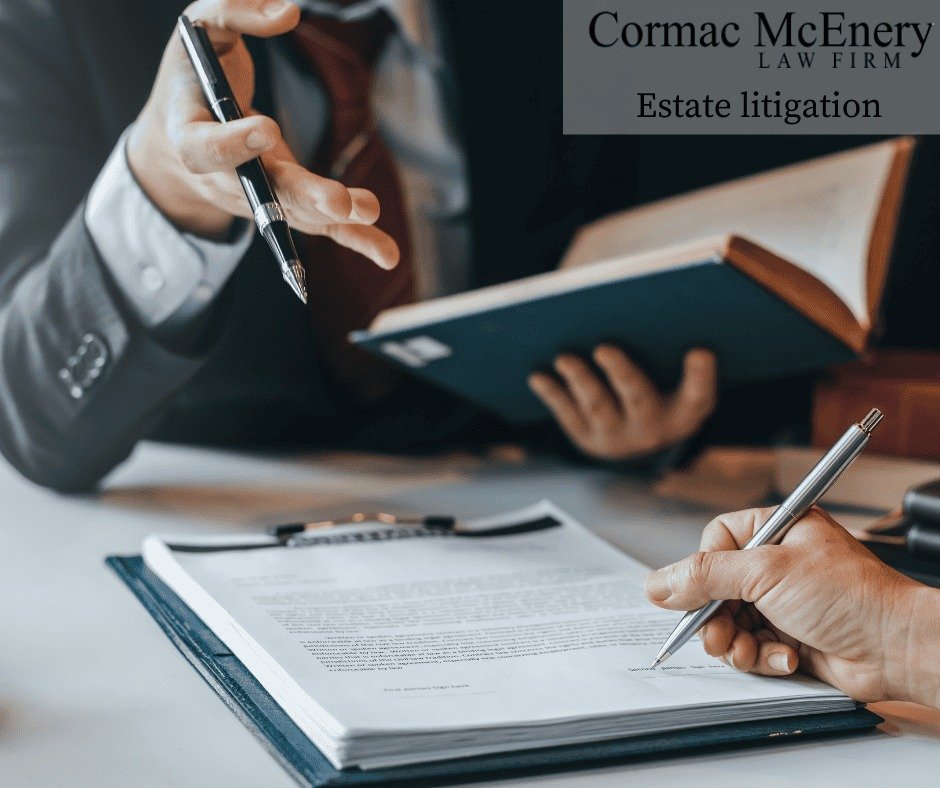Challenges in Estate Disputes and Understanding Estate Litigation Lawyer
Protect Your
Future & Your
Family's Legacy
Schedule a Consultation with an Estate Litigation Lawyer Expert

Understanding Estate Litigation Lawyer
Estate Litigation Lawyer involves legal disputes related to a deceased person’s estate, will, trust, or fiduciary responsibilities. These cases often require court intervention to resolve conflicts, enforce estate plans, or hold fiduciaries accountable.
Common Causes of Estate Disputes
- Will Contests – Claims of undue influence, fraud, or lack of mental capacity.
- Executor Misconduct – Allegations of mismanagement of estate assets or breach of fiduciary duty.
- Beneficiary Disputes – Disagreements over inheritance rights or unfair asset distribution.
- Creditor Claims Against the Estate – Legal challenges related to debts owed by or to the estate.
- Trust Disputes – Conflicts over trust management, validity, or beneficiary rights
At Cormac McEnery Law Firm, we handle all aspects of Estate Litigation Lawyer, ensuring that your case is approached with legal precision and strong advocacy.
Types of Estate Disputes & Legal Challenges
1. Will Contests
Family members or beneficiaries may challenge a will based on:
- Lack of Testamentary Capacity – The testator was not mentally sound when signing.
- Undue Influence – Another party manipulated the testator’s decisions.
- Fraud or Forgery – Claims that the will was altered or falsely executed.
2. Executor or Trustee Misconduct
Fiduciaries (executors or trustees) must act in the best interest of the estate. Legal action may be necessary if they:
- Misuse estate funds or fail to distribute assets properly.
- Refuse to provide a transparent financial accounting.
- Act negligently or fraudulently in estate management.
3. Beneficiary & Inheritance Disputes
Disagreements over asset distribution can escalate into litigation, including:
- Disinherited family members seeking to challenge the will.
- Unequal asset division leading to conflicts among heirs.
4. Creditor & Estate Debt Disputes
Legal challenges may arise when:
- Creditors claim debts against the estate that heirs dispute.
- The estate is owed money and requires legal enforcement.
5. Trust Disputes
Trust litigation can occur due to:
- Failure to distribute assets per the trust’s terms.
- Beneficiary claims that a trust was altered under undue influence.
Your Questions Answered
What is Estate Litigation Lawyer?
Estate litigation refers to legal disputes over wills, trusts, and fiduciary duties. It can include will contests, executor misconduct claims, and inheritance disputes.
Can a will be contested after it has been probated?
Yes, but will contests must be filed within specific legal timeframes. Common grounds include fraud, undue influence, or lack of mental capacity.
What happens if an executor mismanages estate assets?
Executors have a fiduciary duty to manage the estate honestly and efficiently. If they fail, beneficiaries can file a lawsuit for financial restitution or removal.
Can estate disputes be settled without going to court?
Yes. Many estate disputes are resolved through mediation or negotiation, which avoids lengthy court battles. We aim to settle cases quickly while ensuring fairness.
How long does estate litigation take?
It depends on the complexity of the dispute. Some cases settle within a few months, while others may take a year or more if they go to trial.
How much does Estate Litigation Lawyer cost?
Costs vary based on case complexity, attorney fees, and court costs. We provide transparent pricing and discuss legal fees upfront.
Who can file an estate dispute claim?
Beneficiaries, heirs, executors, trustees, and creditors can file estate litigation claims if they believe their rights have been violated.
Take Control of Your Future – Schedule a Consultation Today
A well-structured estate plan safeguards your assets, home, and loved ones from unnecessary legal challenges. Without one, your family may face stressful financial and legal obstacles after your passing.
